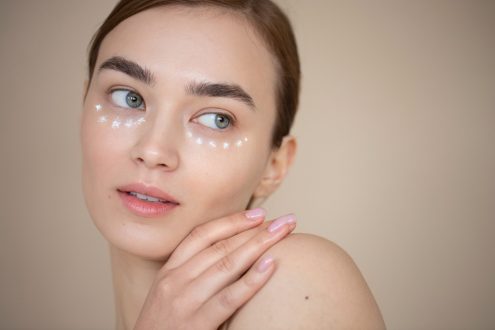- Empty cart.
- Continue Shopping
Do You Really Need Eye Cream?
they are often marketed as a skincare essential, promising to reduce puffiness, dark circles, and fine lines around the delicate eye area. But do you really need a separate product for your eyes, or can a regular moisturizer do the job just as well? Let’s take a closer look at what eye creams offer and whether they’re truly necessary for your skincare routine.
1. Why Is the Skin Around Your Eyes Different?
- Truth: The skin around your eyes is thinner and more delicate than the rest of your face, making it more prone to dryness, wrinkles, and signs of aging. Additionally, because this area has fewer oil glands, it’s more susceptible to dehydration and environmental damage. As a result, some people choose to use eye cream to target these specific concerns.
2. What Does Eye Cream Do?
Eye creams are designed to address issues like:
- Hydration: Many eye creams contain hydrating ingredients like hyaluronic acid or glycerin to combat dryness and keep the skin around your eyes smooth and plump.
- Anti-Aging: Eye creams often include anti-aging ingredients like retinol or peptides, which help reduce the appearance of fine lines and wrinkles.
- Brightening: Ingredients like vitamin C or caffeine can help brighten dark circles and reduce puffiness by improving circulation and reducing inflammation.
3. Can Your Regular Moisturizer Work Instead?
- Truth: In many cases, your regular moisturizer can work just fine for the eye area. If your moisturizer is hydrating and doesn’t contain irritating ingredients, it can provide enough moisture to the delicate skin around your eyes. However, because the eye area is more sensitive, some people prefer to use a specially formulated eye cream that’s lighter and less likely to cause irritation.
4. When Eye Cream Might Be Beneficial
While a regular moisturizer can work for many, there are specific situations where using an eye cream can be more beneficial:
- Targeted Concerns: If you have specific concerns like puffiness, dark circles, or crow’s feet, a dedicated eye cream with ingredients designed to address these issues may be more effective than a general moisturizer.
- Sensitivity: The eye area can be more sensitive to certain active ingredients (like retinoids or acids). Eye creams are usually formulated with lower concentrations of these ingredients to reduce the risk of irritation.
- Makeup Wearers: Eye creams tend to be lighter than regular moisturizers, making them a good option if you wear makeup, as they absorb quickly and won’t interfere with your concealer or foundation.
5. Common Ingredients and Their Benefits
Here are some common ingredients found in eye creams and what they can do:
- Hyaluronic Acid: Helps hydrate and plump the skin, reducing the appearance of fine lines.
- Retinol: Stimulates collagen production, helping to reduce wrinkles and smooth the skin.
- Peptides: Support skin repair and regeneration, promoting firmness and elasticity.
- Caffeine: Helps reduce puffiness and dark circles by constricting blood vessels and improving circulation.
- Vitamin C: Brightens the skin and reduces dark circles by targeting pigmentation.
6. What If You Skip Eye Cream?
- Truth: Skipping it won’t necessarily harm your skin, especially if your regular skincare routine includes hydrating and anti-aging products. However, if you have specific concerns like puffiness or dark circles, using an eye cream formulated for these issues may give you better results.
7. How to Apply
- Truth: If you decide to use an eye cream, proper application is key. Use your ring finger to gently tap the product around your eyes, starting at the inner corner and working outward. Avoid pulling or tugging on the skin, as this can cause further irritation or damage. A little goes a long way, so apply a small amount.
8. When Should You Start Using Eye Cream?
- Truth: There’s no specific age when you need to start using eye cream, but many people begin incorporating it into their routine in their late 20s or early 30s to prevent the signs of aging. If you’re concerned about puffiness or dark circles, you can start earlier to address these issues.
Conclusion: Do You Really Need Eye Cream?
In summary, whether or not you need eye cream depends on your skin concerns and preferences. If your regular moisturizer works well for your eye area, and you’re not dealing with puffiness, dark circles, or fine lines, you may not need a separate product. However, if you have specific concerns or want to treat the delicate skin around your eyes more gently, an eye cream formulated with targeted ingredients can be a valuable addition to your skincare routine. Ultimately, the choice comes down to your individual needs and how your skin responds to different products.


